Dragan Bagić is a researcher at the Department of Sociology at the Faculty of Humanities and Social Sciences in Zagreb. Igor Vidačak, is a research fellow at the European Integration Department at the Institute of International Relations in Zagreb.
ACKNOWLEDGEMENTS
MARPOL International Convention for the Prevention of Pollution from Ships, 1973, as amended by the 1978 Protocol thereto. REMPEC Regional Marine Pollution Emergency Center for the Mediterranean SAA Stabilization and Association Agreement SAPARD Special Accession Program for.
CROATIAN ACCESSION TO THE
EUROPEAN UNION: THE CHALLENGES OF PARTICIPATION
ABSTRACT
Since the end of negotiations will depend more on the implementation than on the mere acceptance of EU requirements, Croatia should turn to an "as soon as ready" instead of an "as soon as possible" policy.
INTRODUCTION
The problems of the economy are discussed in the chapter on the Lisbon strategy, state aid reform and health care policy and reform. We proposed to use the approach as a process of transformation of the country.
CHRONOLOGY OF THE RELATIONSHIP BETWEEN CROATIA AND EUROPEAN UNION
Unfortunately, some of the views turned out to be correct before we even got around to publishing the book, as the EU postponed the start of negotiations. It is also true that Croatia's intentions are to close the chapters faster than any of the previous candidates.
CHANGES IN CROATIA IN THE LAST COUPLE OF YEARS i
Despite the still high level of unemployment and despite realistic expectations that the EU will require a transitional period for workers from Croatia, the government could start to think ahead and strive to liberalize the labor market. Only two percent of the active EU population lives and works in other member states, and the movement of workers is still slow.
Administrative capacities
The strategy of the reform is still being prepared, which may be tantamount to explaining the partiality of the reforms. New laws formally represent a step forward, but enforcement remains problematic due to insufficient preparations, weak administrative structure, legal uncertainty and strong lobbying.
The situation in justice, welfare and civil society
The tight timeframe for negotiations explains the government's reluctance or unwillingness to involve more civil society representatives, but the weak capacity of civil society organizations may also be a reason. Civil society faces a particular problem as Croatia is the only country with which the EU has not formed a joint consultative committee to cooperate with the European Economic and Social Committee.
THE CHALLENGES OF PARTICIPATION
Whatever the reason for the weak participation of civil society in EU-related activities, civil society should not wait for the government to do its job, but if it is capable, it should engage itself and seek information, communication and participation opportunities.
Negotiations, communication and lobbying
In contrast to the last enlargement, the end of the negotiations will depend more on the implementation and less on the mere acceptance of EU demands. As a result, people feel distant from the EU and national institutions and the decision-making process.
Dealing with euroscepticism
When it comes to trust in the EU, none of the demographic and socioeconomic indicators turned out to be significant. This may be due to the small number and low quality of public discussions about.
Confronting the difficulties of the Lisbon agenda, state aid and health care reforms
Although Croatia included some of the Lisbon goals and objectives in various strategic documents (regarding science, research, knowledge society, competitiveness, social cohesion and well-being), implementation instruments are missing. A key factor in the success of health care reform will be the ability of authorities to manage the political economy aspects of the reform.
The environment: challenges and possibilities
Further dedication of the decision-making level of the administration is needed to set the priorities at the operational level in order to manage the programmes. PSSA status can constitute a significant regional cooperation framework in line with EU policy and highlight the awareness of the vulnerability of the Adriatic Sea.
CONCLUSIONS
Because the EU's institutional structure is designed for 27 members, Croatia – possibly the 28th member – faces a specific problem that is often overlooked in the country. Key words that are missing from almost all chapters of the book are implementation, enforcement and action plans.
LITERATURE
Lobbying and Channels of Influence of Croatian Interest Groups in an Enlarged European Union" in: K. The Importance of Environmental Protection: Croatia in the European Union Accession Process" in: K.
ASSESSING THE NEGOTIATION EXPERIENCE: QUICK ACCESSION
The start of accession negotiations is one of the most complex parts of the accession process to manage politically, because this is the moment when "political realities begin to sink in" (Grabbe, 2003:4)i. At the same time, increasing the participation of stakeholders to increase expertise and network skills runs at the expense of "democratic control" since these actors are not elected representatives of the public.
ACCESSION NEGOTIATIONS
A PROCEDURAL OUTLINE
In particular, the focus is on the progress achieved by the candidate countries, which the Commission monitors with progress reports and peer reviews. Since this asymmetry is caused not only by the great negotiating power of the EU, but also by the weaknesses of the candidate countries themselves, the organization of the negotiating group is given special importance.
NEGOTIATION MANAGEMENT STRUCTURES IN COMPARISON
The Office for European Integration was a structural unit of the State Chancellery, subordinate to the Prime Minister; it coordinated national preparations and especially ensured policy cooperation between the line ministries. Crucial was the direct access of the head of the Office for European Integration to the Prime Minister for authorization to resolve inter-ministerial conflicts.
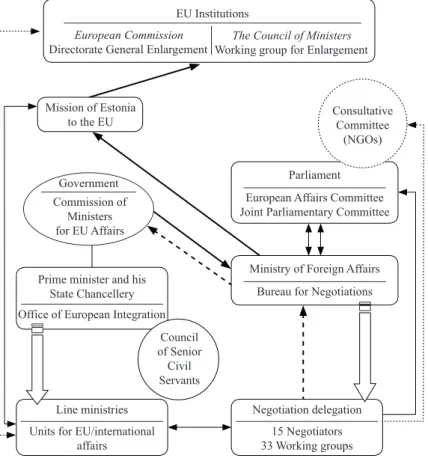
Slovenian negotiation management
The bulk of the political co-ordinating work was carried out by the Government's Office for European Affairs, headed by a minister without portfolio. The Embassy of Slovenia in Belgium played a rather informal role in the new network of the Slovenian Business and Research Association.
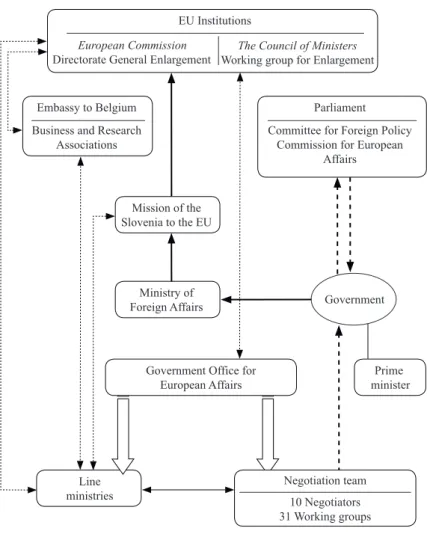
Hungarian negotiation management
The contacts of the Slovenian mission to the EU facilitated responding to EU demands and became even more significant after accession. The committee lacked the expert staff and financial resources to carry out these tasks and was one of the least influential standing committees in the parliament – the idea of turning it into a large committee was rejected by Prime Minister Orbán.
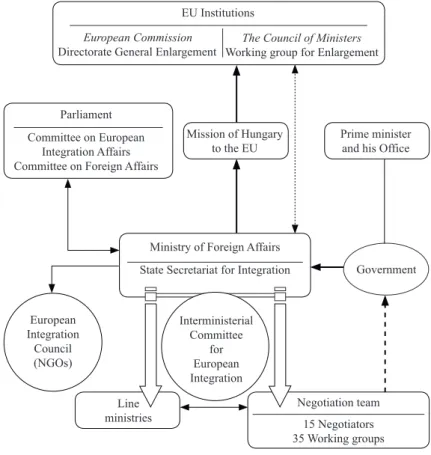
CROATIAN NEGOTIATION MANAGEMENT
In the so-called "European Integration Council", the minister of foreign affairs held regular consultations with representatives of trade unions, employers' organizations, chambers of commerce, etc. Although the leadership of the Secretariat provided guidance in the process of accession, the Ministry of Foreign Affairs was only a line ministry and as such was not authorized or authorized to resolve inter-ministerial conflicts.
A VIEW FROM CROSS NATIONAL COMPARISON
The Coordination, which meets weekly, consists of all ministers, the chief negotiator and the negotiator of the relevant discussion field (without voting). The symptom of a weak parliament is reflected in the tight grip of the Ministry of Foreign Affairs.
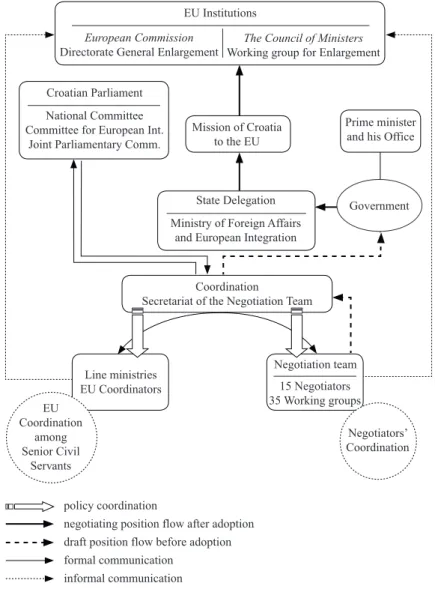
CONSEQUENCES FOR THE INTEGRATION STRATEGY: QUICK ACCESSION OR GOOD
The names of the interviewees will not be exposed in this article, but they are known to the author. This concept played a major role in changing the Union's 2005 enlargement strategy (Commission, 2005b) from a report by the European Parliament from mid-March 2006 (European Parliament, 2006).
COMMUNICATING EUROPE: THE CHALLENGE OF EUROPEANISATION
In the last decade, due to the development of the process (increasing the competences of the EU, expanding its field of activity) and raising public awareness, various general and thematically oriented communication strategies have been adopted. Fourth, it identifies certain characteristics of communication that often harm it and explain its limitations.
DEMOCRACY AND THE COMMUNICATION DEFICIT
Above all, raising public awareness of the EU seems a worthwhile endeavor as it contributes to the project's legitimacy and sustainability. The fact that the "old" Europe seems to be saturated by successive accessions is partly the cause of some of Europe's current problems, such as the slowing down of the further enlargement process.
IMPORTANCE OF COMMUNICATION
There is a sense of uncertainty about the finality of the European project and a virtual collapse of a shared, common vision of what the fundamental purpose and objectives of the EU should be (Palmer, 2005). It can be debated whether there is a direct correlation between communications policy and public support for the EU.
Communicating Europe in the European Union
The first impetus to promote communication came at the time of the creation of the monetary union when Communication on the Information Strategy for the Euro was adopted in 1998. The map would define the modalities of further action for the future Europe in the Constitutional context.
Communicating Europe in member states and candidate countries
A "coalition of the willing and the available", with only two staff members and a group of volunteers conducted qualitative research. In the "name of objectivity", the news media often described accession in terms of a simplistic and rather technical dichotomy of advantages (benefits) and disadvantages (costs) (ibid., 2003).
COMMUNICATING EUROPE IN CROATIA
An analysis will most likely confirm that some of the reasons are common and similar to those experienced by other countries before joining the EU. In the accession process, people's focus shifted from abstract symbolism to the concrete and often painful realities of membership.
FEATURES OF COMMUNICATING EUROPE
Some argue that the current EU crisis has its origins at the national level and is due to national methods of dealing with the EU (Seidenfaden, 2005:75). According to some, Member States have little interest in communicating the benefits of the EU.
EUROPEANISATION OF COMMUNICATION
A failed attempt at Europeanization is reflected in the inability to organize a European referendum on common European issues such as the Constitution. Finally, the Europeanization of communication is also blocked by the lack of a common vision of Europe, the finality of the integration process and a real Europeanization of politics.
CONCLUSION
Reviving people's awareness of the European dimension of the integration process can help Europeanisation. The ratification process of the Constitutional Treaty and the new challenge for the European Union [online].
DOCUMENTS
LOBBYING AND CHANNELS OF INFLUENCE OF CROATIAN
The accelerated dynamics of the European integration process at the end of the eighties gave strong impetus to the proliferation of interest groups at EU level. The EU's enlargement in 2004 with 10 new member states has changed the lobbying rules for everyone with an interest in the EU's political decision-making processes.
PREDOMINANT TRENDS OF INTEREST REPRESENTATION AND LOBBYING AT
The increase in the number of specialist, technical and expert interest groups (Weisbein, 2001) is a response to a growing need for a much more specialized type of information. The diversification already present is further emphasized by the regionalization and decentralization of EU activities, which leads to a greater presence of representatives of regions and regional interest groups in Brussels and Strasbourg.
REGULATORY FRAMEWORK FOR LOBBYING IN THE EUROPEAN UNION
The new amendments to the Rules of Procedure also regulate the issue of financial interests. The contents of the register are published and updated once a year in Lovtidende.
CHANNELS OF INFLUENCE ON EUROPEAN UNION POLICY-MAKING PROCESSES
The Commission by initiating policy proposals and promoting the development of EU interest groups residing in Brussels; (iii) the presence of formal institutionalized structures to represent interests such as advisory committees and (iv) the need for networking and gathering information. According to Bouwen (2002), a potential level of access for certain interest groups to the EU institutions can be explained by the theory of supply and demand of the so-called "access goods".
LOGIC OF ACCESS OF CROATIAN INTEREST GROUPS TO EUROPEAN
As in other countries of Central and Eastern Europe (Perez-Solorzano, 2005), there is still a distinct lack of clear strategies, skills and organization, a lack of understanding of the rules and standards for the representation of interests developed in Western democracies, and finally a lack of understanding of the concept of lobbying and the possibilities that can provide them. A review of the literature on the representation of the interests of Central and Eastern European countries at the EU level (Fink-Hafner, 1994; Perez-Solorzano, 2002) shows several possible channels of influence of these countries on EU decision-making. development in the pre-accession period: national government bodies and diplomatic missions, opening of own representative offices in Brussels and cooperation with related umbrella European interest associations.
Possibilities and constraints of national channels of influence
As far as lobbying in Croatia's accession negotiations with the EU is concerned, interest groups face several problems that make it difficult to choose national state authorities as appropriate channels to influence the outcome of the negotiation process. On the other hand, according to the same survey, the governments of the EU member states are rated as the most effective lobbyists in Brussels.
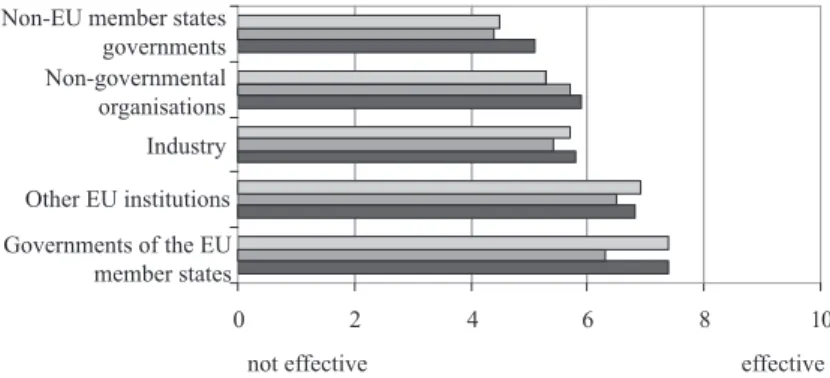
Opening interest representation offices in Brussels
Empirical evidence from Slovenia shows that closer cooperation with EU interest groups is usually presented in domestic circles as evidence of the maturity, respect and "Europeanness" of those groups (Fink-Hafner, 1997). The experience of the Croatian Chamber of Economy shows the continuing problem of lack of interest and insufficient knowledge and skills of those who should primarily benefit from the services of the interest representation office in Brussels (Martinović, 2004).
Networking with European umbrella interest associations: prospects and challenges
In other words, European interest groups face a problem with the expansion of the club similar to those faced by member states in connection with the new EU enlargement. From the perspective of Croatian interest groups, the necessity to defend their own specific interests through structures aimed at promoting more general interests of an umbrella association with 25 or more full members is a challenge.
Towards developing multi-level lobbying strategies
The complexity of the lobbying environment requires Croatian interest groups to develop new strategies involving simultaneous activity at the national and supranational levels. Regardless of the expected difficulties, most authors emphasize that the lobbying game in the EU should remain open to new actors, so that the European system of interest groups does not turn into a hermetic elite system.

TOWARDS EUROPEANIZATION OF POLICY PROCESSES AND LEGITIMISATION OF
Democratic legitimacy for the representation of business interests in the European Union: Normative implications of the logic of access [online]. The impact of EU membership on interest politics in Central and Eastern Europe [online].
THE CONCEPT OF EUROPEAN CITIZENSHIP
Analyzing the structure of European citizenship from a legal point of view, this paper will reveal the main disadvantages and gaps in the current concept. In addition to the free movement of persons and legal changes to European law, the last part of the paper will also analyze the position of citizens of third countries.
THE CONCEPT OF CITIZENSHIP Historical background
The insistence on schools as religion-free zones goes to the heart of the French idea of citizenship. Before the French Revolution, neither the concept of nation nor that of citizen as we know them existed.
Definition of the concept
This model of a relationship between two entities, namely the individual subject or citizen on the one hand, and the representative of a sovereign entity (queen/estate/nation-state) on the other, has provided modern history with a basic pattern of citizenship . Any study of citizenship must refer to these three elements in some way.
Conceptual debates over citizenship
In the broadest sense, citizenship can be defined as setting the conditions for the institutionalized relationship between citizens and state/society. It follows that at least three elements must be taken into account in the conceptualization of an ideal-type citizenship.
THE PARADOX OF EUROPEAN CITIZENSHIP The road toward the launching
At a meeting of the Council of Rome in October 1990, during the drafting of the guidelines of the Intergovernmental Conferences (IGCs), the concept of European citizenship was introduced as an essential part of the reform of the Treaties, and with some characteristics and similar rights as those that existed before. later included in the Treaty on EU or the Maastricht Treaty.vii It was the Spanish delegation that first presented a document on European citizenship to the IGCs in October 1990. After several negotiations, and with the enthusiastic support of the European Parliament, which adopted two favorable resolutions in 1991, the Treaty of the EU was finally adopted to internalize European citizenship.
European citizenship and European supranational statehood
Differences between citizenship laws in different Member States are directly reflected in Union citizenship. Some of the problems related to Union citizenship are therefore linked to national citizenship in EU countries and large countries.
IMPLICATION OF EUROPEAN CITIZENSHIP FOR FUNDAMENTAL RIGHTS
The possibility of becoming a citizen of the Union varies depending on where in the Union a person lives. A way to overcome these differences and thereby strengthen Union citizenship would be the harmonization of citizenship legislation in the Member States.
Fundamental rights of European citizens
Citizenship of the Union consists of a set of rights enshrined in the EU Treaties, in addition to the rights of national citizenship. Any person who holds the citizenship of an EU member state is automatically an EU citizen.
Limitations of citizens’ rights
Moreover, the EU does not constitute a common public sphere in any meaningful sense of the term. It should be emphasized that the whole problem of European citizenship is not only a problem of which rights are included or omitted from the concept.
CITIZENSHIP TOMORROW Towards a European citizenship
To date, very little is known about the effectiveness of the EU citizenship model. Charter of Fundamental Rights of the EU: Solemn Declaration of the European Parliament, the Commission and the Council of 7 December 2000.
CASE LAW OF THE EUROPEAN COURT OF JUSTICE
EUROSCEPTICISM IN CROATIA
ON THE FAR SIDE OF RATIONALITY?
In the second part, I outline the dynamics of two basic dimensions of euroscepticism in Croatia; the increase in the reluctance to join and the relative stability of the lack of trust in the EU. The last, fourth, part presents a debate that places the findings in the context of the debate about the rational (pragmatic) and irrational (symbolic) bases of Euroscepticism in general.
EUROSCEPTICISM: THEORY AND PRACTICE
In the first case, popular euroscepticism will depend on the success of the country during transition. Unlike the dynamics of attitudes towards accession, distrust in the EU is relatively stable over the period.
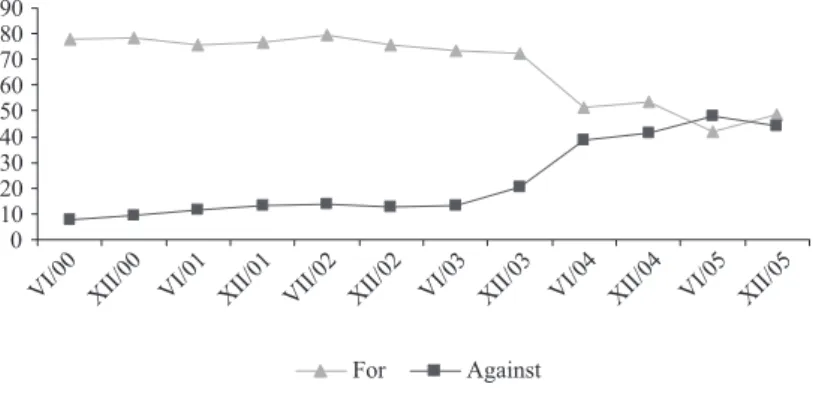
THE BOUNDED RATIONALITY OF CROATIAN EUROSCEPTICISM?
The findings in Table 3 provide some empirical arguments for the irrationality versus bounded rationality debate regarding the motives for trust or lack of trust in the EU. The correlation between trust in national institutions and trust in the EU confirms Anderson's proposal (Anderson, 1998; Rimac and Štulhofer, 2004).

THE STRUCTURE OF CROATIAN EUROSCEPTICISM
The use of the proxy mechanism does not depend only on the availability of information about the EU. Each of the questionnaires contained a single indicator of attitudes towards the EU – trust in the EU in SEESSP-A and views on accession in SEESSP-B.
CONCLUSIONS AND RECOMMENDATIONS
The strengthening of rational attitudes towards the EU depends on the success of the government in creating the conditions for utilitarian assessment of the accession to the EU. Contemporary Euroscepticism in the Party System of the EU Candidate States of Central and Eastern Europe”.
ANALYSIS OF BENEFITS AND HARMS AS A FACTOR IN CITIZEN SUPPORT
An unsystematic analysis of the Croatian public discourse on European integration leaves the impression that the utilitarian perspective is one of the dominant angles from which the European accession process is observed. In order to analyze hypotheses about general expectations as an expression of a rationalization of political views, we decided to measure the perception of the EU's attitude towards Croatia.
THE THEORETICAL FRAMEWORK: THE UTILITARIAN APPROACH TO EXPLAINING
Another weakness of the utilitarian model is that it is entirely focused on egoistic utilitarianism, on the personal level. This hypothesis seems to us to be very important for an evaluation of the utilitarian approach to an explanation of support for European integration.
RESEARCH METHODOLOGY
For example, the migration of young people abroad can be a negative or positive consequence, depending on the personal preferences of the subject. In the factor analysis of these six statements, two factors were formed, the first of which is primarily formed by statements about the EU's attitude towards Croatia in the context of regional politics and the attitude towards the Internal War, and a second on progress regarding an evaluation.
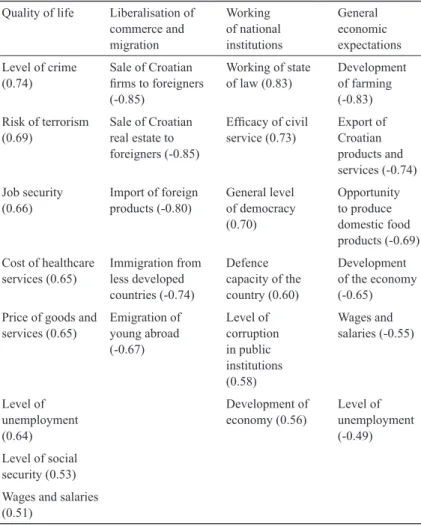
RESULTS
Predictions of views about entry into the European Union on the foundation of general expectations
A logistic regression analysis shows that there is a strong correlation between general expectations at personal and national level and a general image of Croatia's accession to the EU.xiv Such a result is not a surprising discovery, but it does confirm the correlation. of the first hypothesis between the expected harms and benefits and the general attitude towards EU membership. It is very clear that more than three quarters of respondents who support EU accession expect more benefits than harm for themselves personally, but also at the level of the country as a whole.

Prediction of views about accession to the European Union on the basis of concrete
This is indicated by the reverse order of the logic of thought, compared to the expectations of the utilitarian aspect of the definition of views on support for integration. Clearly, a position on aid is not taken mainly on the basis of an objective analysis of the consequences, but is largely determined by some other predictors.
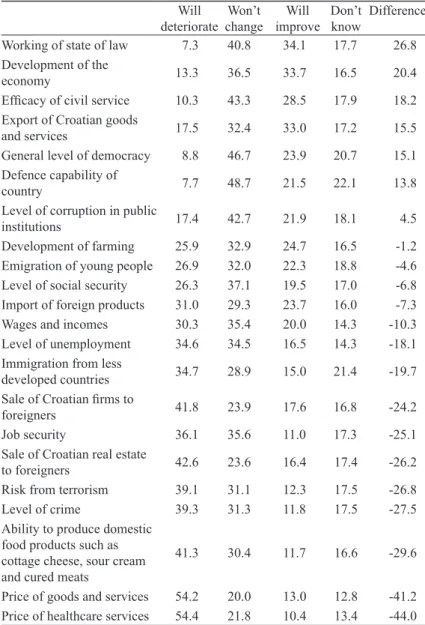
The relation between general and concrete expectations
A proper and objective analysis should lead to more or less consistent results of thinking, at least in some individual expectations of changes arising from the approach and the results of these changes. Of course, this finding does not mean that the decision on support is not based to a certain extent on an objective analysis of the consequences, but only that it is also influenced to a very large extent by other elements.
![Table 1 Key features of the negotiation structures in comparison Source: Lippert, 2001; Brusis [et al.], 2000; author’s interviews](https://thumb-eu.123doks.com/thumbv2/9dokorg/19367939.0/65.639.132.511.114.854/features-negotiation-structures-comparison-source-lippert-brusis-interviews.webp)
